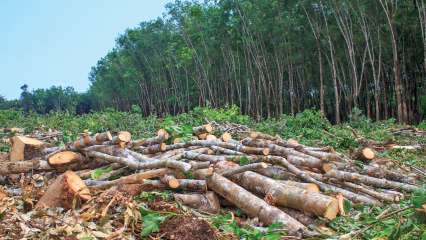In a major decision that came on Monday underscoring India’s commitment to environmental protection, the Supreme Court has directed states and union territories to adhere to an expansive definition of “forests” laid down in its 1996 judgment.
This interim order comes amidst controversy around the Forest Conservation (Amendment) Act, 2023 which environmentalists argue, dilutes the scope of forest conservation.
The apex court’s ruling aims to uphold the dictionary meaning of forests until governments furnish comprehensive details of all forest lands in their jurisdictions.
This reaffirms long-standing judicial precedent on maintaining robust protection for the country’s vital forest cover.
Forests: All-Encompassing Definition Upheld
In its interim order, the Supreme Court emphasized that the term “forest” must encompass all land resembling the dictionary definition of forests.

This includes notified forests, deemed forests, protected areas, and other ecologically significant parcels.
By upholding the 1996 Godavarman judgment, the apex court has ensured that a wide array of lands will continue to be identified as forests warranting protection under the Forest Conservation Act.
Environmentalists have lauded this decision to uphold an expansive interpretation of the term “forest.”
They argue that this preserves the frameworks established by decades of judicial intervention aimed at furthering environmental safeguards.
Controversial 2023 Amendments
The Supreme Court’s ruling provides temporary relief against the Forest Conservation (Amendment) Act introduced in 2023 by the Central Government.
The amendments had narrowed the definition of forests and reduced the applicability of the Conservation Act.

As a result, over 1.97 lakh sq km of unnotified forest lands were under threat of denotification across different states.
Environmental experts raised concerns that this would encourage unchecked diversion for non-forest purposes.
Hearing petitions filed by conservationists and former civil servants, the apex court has now halted the implementation of the 2023 amendments.
Its directive ensures status quo on the identification of forests based on past precedent.
Judicial Oversight on Environmental Decisions
With its latest order, the Supreme Court has reinforced its position as a watchdog safeguarding India’s forests and balancing environmental and development needs.
Back in 1996, the Godavarman case judgment established environmental governance as falling under the judiciary’s purview.
By underscoring this supervisory role, the apex court has asserted that transparency and accountability must underpin all governmental decisions affecting forest conservation.
This emphasis on oversight is expected to discourage arbitrary changes that threaten fragile ecosystems.
Implications for Forest Conservation
The Supreme Court’s interim order has several vital implications:
- It prevents large-scale denotification of woodlands and maintains existing protection cover.
- The continuation of identifying deemed woodlands ensures even unrecorded patches are safeguarded.
- It balances forest conservation needs with responsible infrastructure development.
- The order upholds the delicate green cover crucial for climate regulation and sustenance needs.
- It safeguards the rights and livelihoods of indigenous communities dependent on these woodlands.
Government Directed to Furnish Details of Forest Lands
Complying with the Supreme Court’s directives, the Central Government has been asked to publish consolidated details of all forest lands in India by April 2024.
State and UT governments must provide exhaustive records of deemed forests, protected areas and other ecologically significant lands within their jurisdictions.
The availability of this verified data will enable transparent and accurate identification of forests warranting stringent protection.
Environmentalists have welcomed this move towards ensuring clarity and plugging gaps in forest conservation efforts.
Over the next months, the accuracy of these records will be pivotal to charting the future course for preserving fragile ecosystems while balancing developmental needs.
Also read about, Assam Scraps Muslim Marriage Law & Sudarshan Setu Inauguration












Comments 1